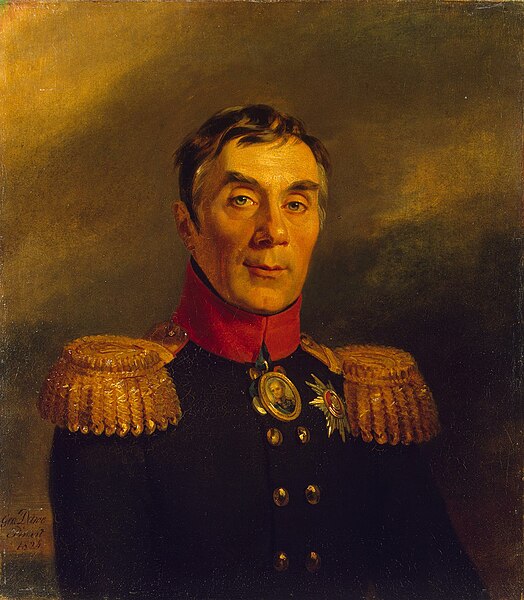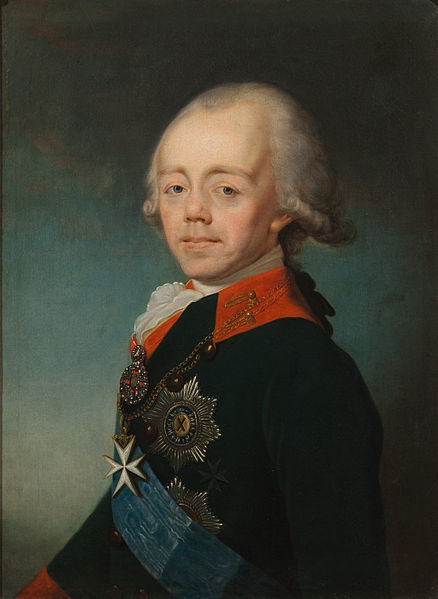 |
| Old Riga |
Childhood
Dorothea,
Countess Lieven, was born in Riga
on 17th December 1785, the youngest of four children of Christopher
von Benckendorff[i],
the military governor. Dorothea’s mother, Charlotte Schilling was one of the
attendants of Czarevitch
Paul’s new bride, Sophia
Dorothea of Wurttemberg,
who like all Russian royal brides converted to the Orthodox faith
and took the name Maria Feodorovna. Charlotte stayed at court to serve her
mistress. supporting her in her antagonism towards Paul’s mistress and
aggravating a marital feud.
But when the Empress Catherine died
Paul became Czar, Charlotte was no longer required at court[ii] and she joined her
husband in Riga. The rigours of fortress life did not suit Charlotte and she
died not long after her arrival leaving her children to the care of their
godmother. The Empress paid for Dorothea’s brothers, Constantine
and Alexander,
education; Maria Feodorovna had Marie and Dorothea educated at the former
convent at Smolny[iii],
.jpg) |
| Empress Maria Feodorovna |
Before she died Charlotte had encouraged the suit of a Count
von Elmpt who wanted to marry Dorothea. The Empress forbad the match and sent the
11 year old Dorothea back to Smolny. In later years Dorothea recalled that she;
‘Loved
him with all my heart, I thought of nothing else.’[iv]
Dorothea entered into a clandestine correspondence with
Elmpt who had been banished from St Petersburg. One of
her governesses acted as a go-between, but the correspondence was discovered
when the Empress unexpectedly descended upon Smolny to visit Dorothea and
Marie. Elmpt was sent packing.
An Engagement
 |
| Winter Palace |
At the age of 15 Dorothea joined Marie, now one of the
Empress’ ladies-in-waiting, at the Winter Palace. Dorothea
was not considered a beauty; she was tall and thin with little to show in the
way of a bust. She relied on her wit and conversation to ensnare the men. But the
Benckendorff family’s proximity to the fount of all power in Russia ensured
that Dorothea did not go short of suitors.
 |
| Count Aracheyev |
The Empress proposed that Dorothea marry one Count Aleksei Aracheyev,
a provincial noble who was a brutal military man. She escaped the marriage by
dint of the Czar’s whim; Arakcheev fell out of favour before the marriage could
be agreed[v].
While still at Smolny Dorothea was engaged to the third son
of Charlotte
von Gaugreiben, Imperial governess, Madame de Lieven. Christopher
Andreivich Lieven[vi] was a Livonian nobleman and a
general in the artillery.
In 1797 Christopher was made Emperor Paul’s aide-de-camp and the family was given hereditary title to an estate at Mežotne. In 1798 he was promoted to the rank of Major-General and assigned to the post of the Director of the Mobile Field Chancellery and Minister of War. On 22nd February 1799 Madam de Lieven was made a Countess and her son automatically became Count Lieven.
In 1797 Christopher was made Emperor Paul’s aide-de-camp and the family was given hereditary title to an estate at Mežotne. In 1798 he was promoted to the rank of Major-General and assigned to the post of the Director of the Mobile Field Chancellery and Minister of War. On 22nd February 1799 Madam de Lieven was made a Countess and her son automatically became Count Lieven.
 |
| Countess Charlotte von Lieven |
As Christopher’s fiancée Dorothea was allowed to attend
court; she revelled in the attentions bestowed upon her by the young male
courtiers. Christopher was jealous of Dorothea’s court and she was packed back
off to Smolny where she was freely disparaging with her remarks about her fiancé.
Christopher was upset by Dorothea’s comments which made their way back to him;
‘Mlle
de B. said openly that she no longer loves you, that she will never stop
flirting….and that she is only marrying you to get away from the convent.’[vii]
For several days Dorothea did not get her daily letter from Christopher
and got ribbed by the other schoolgirls.
Bending Before the Wind
Finally Christopher wrote to Dorothea;
‘All
my happiness has changed into black grief....you forgot, and even humiliated a
man who was utterly devoted to you....it does not surprise me that you found in
this society several men you preferred to me, and who suit you better than I
do.’[viii]
He offered to break off the engagement.
But Dorothea, who was desperate to leave the convent, was
shrewd enough to know that losing such a fiancé would not improve her marital
chances. She turned to illness, as she was to do so often throughout her life,
to get herself out of trouble. She wrote to Christopher informing him of her
illness and begged for forgiveness.
At a hastily arranged meeting between the affianced couple Dorothea
promised to change her character to suit Christopher who did not want a society
wife. Dorothea married Christopher on 24th February 1800; she was
wearing diamonds, a gift from the Czar.
Regime Change
 |
| Gatchina Palace |
But it was not long before Christopher fell foul of the Czar,
having failed to attend a military parade at Gatchina. The Czar, a
military martinet, called Christopher an imbecile to his face. Christopher and
Dorothea retired from court on the grounds of Christopher’s ill-health. The
Czar’s own English doctor, Dr Beck, was sent every day to check on the state of
Christopher’s health.
Paul had alienated many of the nobility by removing many of
the privileges his mother had granted them. Paul’s autocratic behaviour and
overt control of social life down to dress, dance and even colour of permissible
clothing along with the militarisation of government led to his downfall. During
1801 over 100 officers of the Imperial Guard were imprisoned for trifling
offences[ix].
 |
| Czar Paul |
His mother Catherine had been an autocrat, but an
enlightened one. One diarist recorded;
‘The
late Catherine had had the intention.....to give up the crown to her favourite
grandson Alexander, for in her son she did not find the abilities to administer
so extensive an empire.’[x]
Paul’s murder on 23rd March 1801 came only 12
days after Paul had removed Christopher from his posts, claiming he had
been ill for too long.
‘Your
indisposition has lasted too long, and as business cannot depend on your
intestines you will have to send back your portfolio of war to Prince Gagarin[xi].’[xii]
Neither Christopher nor Dorothea were implicated in the
Czar’s murder and Christopher found favour with the new Czar, Paul’s son Alexander I who
made Christopher his Aide-de-Camp.
Dorothea and Christopher had one daughter, Magda born in
1804, and three sons: Christopher was enraptured by his daughter as Dorothea
wrote to her brother Alexander;
‘I
wish you could see my husband with his child. He is altogether wrapped up in
her. But then she is so attractive.’[xiii]
Their son Paul was born on 24th February 1805,
Alexander on 9th March 1806 and Konstantin was born in 1807. The
Empress was godmother to all three boys.
One of Dorothea’s earliest lovers was Prince Peter Dolguruky who was
a friend of the family. She also had an affair with Grand
Duke Constantine[xiv],
heir presumptive and a military martinet who drove his wife out of Russia. Even
Dorothea admitted that his virtues were outweighed by his vices.
War
 |
| Napoleon at Austerlitz |
Christopher was very much involved in the Russian fight
against Napoleon, whose
drive for empire saw him conquer much of Europe. While Napoleon was conquering
much of Europe Alexander saw himself as a peacemaker; it was not until the
French crept closer to the Russian borders that Alexander became concerned.
Christopher was present at the battle of Austerlitz at
which Napoleon crushed the armies of Russia and the Holy Roman Empire., and at
the signing of the Treaty of Tilsit[xv] on 7th July
1807, the year Christopher was made Lieutenant-General.
.jpg/800px-Catherine_Palace_%26_Cameron_Gallery_(Premazzi).jpg) |
| Catherine Palace at Tsarskoe Selo |
Magda died in 1807, possibly from the poor St Petersburg
climate[xvi]. Dorothea’s grief
embittered her against Christopher, absent on the Czar’s business. She withdrew
to Tsarskoe Selo and
refused to journey to Tilsit for
the signing of the treaty.
When Christopher was with her the couple argued, although
Dorothea assured her brother this was only because she was arguing with anyone
she came into contact with. This may have been a way of easing her grief
coupled with her anger at Russia’s defeat at the hands of the French. That
France and Russia were now allied only added to Dorothea’s anger.
‘From
morning to night I argue with everyone I meet…..In fact I need to argue to kill
my bad temper which I cannot overcome……I am established here in spite of my husband’s
return, and am content to see him for a few hours once a week.’[xvii]
Bibliography
Catherine the Great –John T Alexander, Oxford University
Press 1989
The Princess and the Politicians – John Charmley, Penguin
Books 2006
Paris Between Empires – Philip Mansel, Phoenix Press
Paperback 2003
The Russian Empire – Hugh Seton-Watson, Oxford University
Press 1988
Arch Intriguer – Priscilla Zamoyska, Heinemann Ltd 1957
www.wikipedia.en
[ii]
She’d antagonised Paul by encouraging Maria Feodorovna in her antagonism
towards Paul’s mistress
[iii]
Catherine had it turned into a ‘school’ for girls to learn French, German and
Italian, learn to play the piano and dance
[v]
He was still in exile by the time Paul was murdered in 1801
[vi]
The links for Christopher and his mother have been translated from the Russian
[vii]
Arch Intriguer - Zamoyska
[viii]
Ibid
[ix]
Including having hair too long or wearing waistcoats
[x]
Catherine the Great - Alexander
[xi]
Prince Grigory Ivanovich Gagarin,
later ambassador to Italy
[xii]
Arch Intriguer - Zamoyska
[xiii]
Ibid
[xiv]
Possibly little more than a flirtation
[xv]
Signed by Napoleon, Alexander and Frederick William
[xvi]
Renowned for diseases spread by insects living in the surrounding swamps
[xvii]
Arch Intriguer - Zamoyska

Eleven? she was a bit precocious... but then, escaping a nunnery might have had more to do with it...it appears to have been a most unsatisfactory childhood.
ReplyDeleteGreat post, thank you so much for sharing.
ReplyDeleteI think Dorothea to be an extraordinarily interesting person. Do we get to hear more of her on your blog?
Thank you; Dorothea was rather different from most other ladies of her time. I am currently working on parts 5-7 on Dorothea and they will be posted in due course
Delete